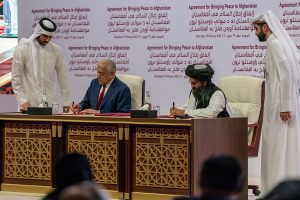During his first term, U.S. President Donald Trump’s administration signed a peace agreement with the Taliban to end two decades of war. The agreement set a timeline for the United States and its allies to fully withdraw their troops from Afghanistan, while the Taliban pledged to “prevent the use of the soil of Afghanistan by any group or individual against the security of the United States and its allies.”
Also under the deal, the Taliban were to initiate negotiations with the Afghan Republic government, which was not even part of the peace deal between the Trump administration and the Taliban. The intra-Afghan negotiations between the Taliban and the then-Afghan government never took place, however. Instead, the Taliban became the de facto rulers of Afghanistan after taking over Kabul amid the haphazard withdrawal of the U.S. forces from Afghanistan during the summer of 2021. A recent U.S. House Foreign Affairs Committee report slammed with withdrawal as willful blindness on the part of the Biden Administration but it, indeed, was a face-saving act for Washington.
In January 2025, Trump will enter the White House for his second term. How will he deal with the Taliban issue and make amends for the 2020 Doha Agreement?
During his electoral campaign, Trump slammed the Biden-Harris administration, particularly Democratic presidential candidate Vice President Kamala Harris, for the collapse of U.S. respect and credibility in Afghanistan. Trump called the U.S. withdrawal from Afghanistan “the most embarrassing moment in the history of our country” and promised that there would be consequences for those responsible for the hasty withdrawal. Trump also claimed that, had he been in power at the time, he would have given orders to evacuate from Bagram Airfield instead of Kabul’s airport, where a suicide bombing killed at least 182 people, including 13 U.S. personnel supporting the evacuation mission.
However, in response to Trump’s remarks, Harris’ campaign emphasized Trump’s announcement of a meeting with the Taliban leaders in Camp David – an offer that he later abruptly canceled – and the role played by the deal that his administration signed with the current de facto rulers of Afghanistan in the U.S. withdrawal. Harris’ campaign highlighted that Trump’s Taliban agreement paved the way for a virtually impossible deadline, which left the Biden administration with no plans for an orderly withdrawal from the country.
It is easy to point fingers while out of office. But the tables have turned, and the ball is in President-elect Trump’s court once again. Once back in power, he needs to decide how his administration will deal with the Taliban.
In Trump, Afghanistan sees a familiar face – the man who threw them into this chaos. The de facto rulers of Afghanistan, however, see a different picture. Taliban leaders see a man who gave in to their demands and agreed to negotiate with them directly without considering the erstwhile Afghan Republic government. In the incoming Trump administration, the Taliban see another opportunity to sit across the table with U.S. officials to discuss the fate and future of Afghanistan, likely without any other group from the country. They expect improved relations between the United States and the Taliban and even diplomatic recognition under the Trump presidency.
The Taliban’s Foreign Ministry expressed hope after the recent election results, saying that the incoming Trump administration would adopt a pragmatic approach toward the bilateral relations that could allow Kabul, under the Taliban, and Washington to open a new chapter in their relations based on mutual engagement. It is pertinent to note here that the Taliban’s rule in Afghanistan is formally not recognized by any country, including the United States.
On the other hand, the Trump administration may take a different tack and instead exert more pressure on the Taliban to form an inclusive government, which is part of the Doha Agreement and a prerequisite for the Taliban to get diplomatic recognition. Trump’s pick for secretary of state, Senator Marco Rubio, is a hardline critic of the Taliban and considers Taliban-ruled Afghanistan to be a direct threat to the national security interests of the United States and its partners in Central Asia and the Middle East. Rubio also wants the Taliban to be designated as a Foreign Terrorist Organization.
Given these speculations, Trump’s presidency is likely to be a quagmire for the people of Afghanistan, who have been living under the Taliban regime for over three years now. Some experts expect that Trump’s presidency will have economic repercussions for Afghanistan, which has been faced with a humanitarian crisis since the Taliban’s takeover of Kabul. The United States has been the biggest humanitarian aid donor to Afghanistan since August 2021. That aid, however, has seen a major drop over the past two years and seems likely to drop further under Trump’s presidency. Trump might also decide to provide humanitarian aid as usual but with certain conditions that would augment the vulnerabilities of already crisis-ridden Afghan people. In such a situation, the only group that would suffer is the common people of Afghanistan, particularly Afghan women and young girls.
The responsibility for the current situation in Afghanistan lies with Trump’s first administration and the ensuing Biden administration. Now Trump has a chance to make amends and alleviate the sufferings of the people of Afghanistan. His previous administration, despite several ups and downs, successfully negotiated a deal, however flawed, with the rogue group. Therefore, he should bring the Taliban to the negotiating table to ensure that they fulfill their commitments made under the Doha Agreement.
However, this time, instead of giving in to the Taliban’s demands, his administration should make sure that all the Afghan groups are part of the negotiations for lasting peace in Afghanistan. Only inclusive negotiations will bring peace to the people of Afghanistan and ensure them a secure future in their own country.
































